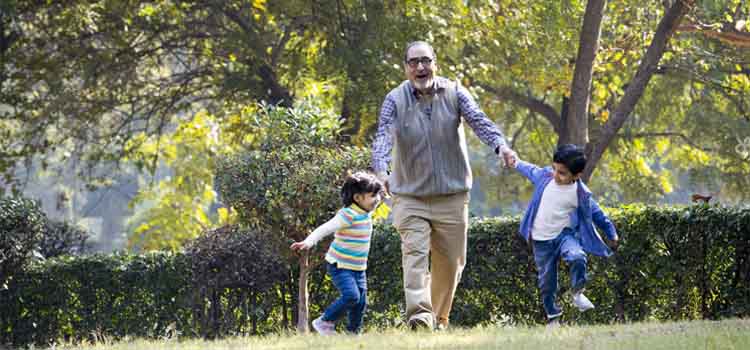In today's rapidly changing world, elderly individuals often find themselves facing unique challenges that can lead to feelings of depression and isolation. Let's explore the causes and symptoms of depression among the elderly, diving into the role of the modern age in amplifying these issues. Additionally, highlighting the significance of the intergenerational relationship between grandparents and their grandchildren as a potential source of solace and support.
Causes of Depression among Elderly Individuals:
1. Social Isolation: Elderly people may experience reduced social interaction due to factors such as retirement, loss of friends and family members, or physical limitations, leading to feelings of loneliness and depression.
2. Loss and Grief: The loss of loved ones can have a profound impact on the mental well-being of elderly individuals, increasing their vulnerability to depression.
3. Health Issues: The onset of chronic illnesses, declining physical abilities, and the challenges of managing age-related health conditions can contribute to depressive symptoms.
4. Financial Insecurity: Financial struggles, inadequate retirement savings, and limited access to essential resources can cause stress and contribute to depression among the elderly.
Symptoms of Elderly Depression:
1. Persistent sadness, emptiness, or feelings of hopelessness.
2. Loss of interest or pleasure in previously enjoyed activities.
3. Changes in appetite or weight.
4. Sleep disturbances, including insomnia or excessive sleeping.
5. Fatigue, lack of energy, or reduced motivation.
6. Irritability, restlessness, or agitation.
7. Difficulty concentrating or making decisions.
8. Thoughts of death or suicide.
Cure and Management:
1. Professional Help: Seeking assistance from mental health professionals, such as Psychologists or Psychiatrists, can provide effective treatment options, including Therapy and Medication.
2. Supportive Networks: Encouraging elderly individuals to engage in social activities, join support groups, or participate in community programs can help combat feelings of isolation.
3. Healthy Lifestyle: Promoting regular physical exercise, a balanced diet, and sufficient sleep can have a positive impact on mental well-being.
4. Encouraging Intergenerational Bonds: The relationship between grandparents and grandchildren can offer emotional support and companionship, reducing feelings of depression and fostering a sense of purpose.
The Role of Grandchildren in Alleviating Depression:
1. Emotional Connection: Spending time with grandchildren can provide a sense of joy, purpose, and unconditional love, thereby boosting an elderly person's emotional well-being.
2. Social Engagement: Interacting with grandchildren allows elderly individuals to participate in meaningful social interactions, reducing feelings of loneliness and isolation.
3. Cognitive Stimulation: Engaging in activities with grandchildren, such as storytelling, board games, or teaching new skills, can enhance mental agility and provide a sense of accomplishment.
4. Increased Physical Activity: Participating in outdoor activities or playing with grandchildren can promote physical exercise, benefiting both the physical and mental health of elderly individuals.
Depression among the elderly is a pressing issue in today's age, exacerbated by factors such as social isolation, health challenges, and financial insecurities. However, the relationship between grandparents and grandchildren holds immense potential for alleviating depressive symptoms. By nurturing these intergenerational bonds, we can offer love, support, and companionship to our elderly loved ones, promoting their mental well-being and creating a mutually fulfilling and enriching relationship for both generations.

 Depression among the elderly is a pressing issue in today's age, exacerbated by factors such as social isolation, health challenges, and financial insecurities. However, the relationship between grandparents and grandchildren holds immense potential for alleviating depressive symptoms
Depression among the elderly is a pressing issue in today's age, exacerbated by factors such as social isolation, health challenges, and financial insecurities. However, the relationship between grandparents and grandchildren holds immense potential for alleviating depressive symptoms










.jpeg)




.jpeg)

.jpg)













